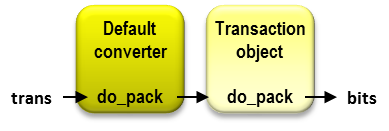UVMC Converter Example - SC In-Transaction
This example’s packet class defines do_pack and do_unpack methods that are compatible with the default converter in SC. The default converter merely delegates conversion to these two methods in the transaction class.

This approach is not very common in practice, as it couples your transaction types to the UVMC library.
Instead of defining member functions of the transaction type to do conversion, you should instead implement a template specialization of uvmc_convert<T>. This leaves conversion knowledge outside your transaction proper, and allows you to define different conversion algorithms without requiring inheritance.
| UVMC Converter Example - SC In-Transaction | |
| This example’s packet class defines do_pack and do_unpack methods that are compatible with the default converter in SC. | |
| User Library | This section defines a transaction class and generic consumer model. |
| Conversion code | We do not need to define an external conversion class because it conversion is built into the transaction proper. |
| Testbench code | This section defines our testbench environment. |
User Library
This section defines a transaction class and generic consumer model. The transaction implements the do_pack and do_unpack methods required by the default converter.
Packing and unpacking involves streaming the contents of your transaction fields into and out of the packer object provided as an argument to do_pack and do_unpack. The packer needs to have defined operator<< for each type of field you stream. See UVMC Type Support for a list of supported transaction field types.
namespace user_lib {
using namespace uvmc;
class packet_base
{
public:
enum cmd_t { WRITE=0, READ, NOOP };
cmd_t cmd;
unsigned int addr;
vector<unsigned char> data;
virtual void do_pack(uvmc_packer &packer) const {
packer << cmd << addr << data;
}
virtual void do_unpack(uvmc_packer &packer) {
packer >> cmd >> addr >> data;
}
};
class packet : public packet_base
{
public:
unsigned int extra_int;
virtual void do_pack(uvmc_packer &packer) const {
packet_base::do_pack(packer);
packer << extra_int;
}
virtual void do_unpack(uvmc_packer &packer) {
packet_base::do_unpack(packer);
packer >> extra_int;
}
};
// a generic target with a TLM2 b_transport export
#include "consumer.cpp"
}Conversion code
We do not need to define an external conversion class because it conversion is built into the transaction proper. The default converter will delegate to our transaction’s do_pack and do_unpack methods.
We do, however, define operator<< (ostream&) for our transaction type using UVMC_PRINT macros. With this, we can print the transaction contents to any output stream.
For example
packet p; ...initialize p... cout << p;
This produces output similar to
'{cmd:2 addr:1fa34f22 data:'{4a, 27, de, a2, 6b, 62, 8d, 1d, 6} }You can invoke the macros in any namepace in which the uvmc namespace was imported and the macros #included.
using namespace user_lib; UVMC_PRINT_3(packet_base,cmd,addr,data) UVMC_PRINT_EXT_1(packet,packet_base,extra_int)
Testbench code
This section defines our testbench environment. In the top-level module, we instantiate the generic consumer model. We also register the consumer’s in export to have a UVMC connection with a lookup string, stimulus. The SV-side will register its producer’s out port with the same lookup string. UVMC will match these two strings to complete the cross-language connection, i.e. the SV producer’s out port will be bound to the SC consumer’s in export.
class sc_env : public sc_module
{
public:
consumer<packet> cons;
sc_env(sc_module_name nm) : cons("cons") {
uvmc_connect(cons.in,"stimulus");
}
};
// Define sc_main, the vendor-independent means of starting a
// SystemC simulation.
int sc_main(int argc, char* argv[])
{
sc_env env("env");
sc_start();
return 0;
}